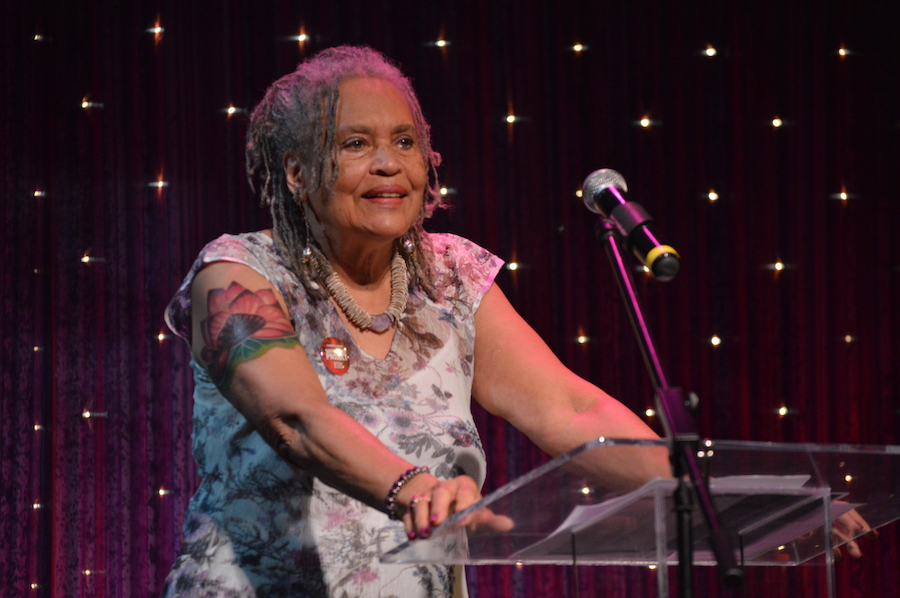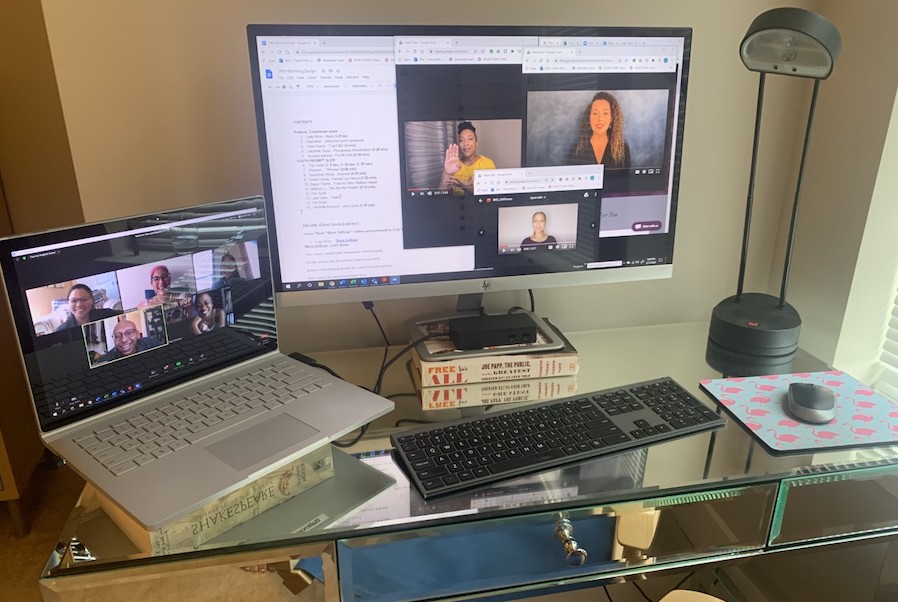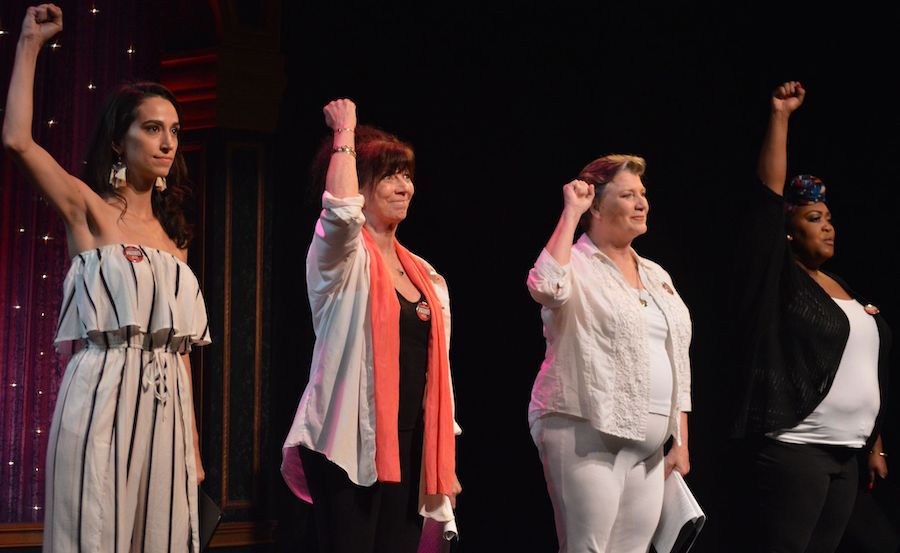While theatres remain dark this summer, companies across the country are moving ahead with long-planned events to celebrate this year’s consequential centennial: the ratification of the Nineteenth Amendment to the U.S. Constitution on Aug. 18, 1920, which gave American women the right to vote, 133 years after it was first granted to men. From education programs to poetry readings, from virtual vigils to historic speeches, theatre organizations are finding ways to connect with their communities to mark the milestone this month.
In Raleigh, North Carolina, Burning Coal Theatre has been preparing “The 19th Amendment Project” for over two years. The president of the League of Women Voters of Wake County, Dianna Wynn, proposed the statewide celebration while talking to the artistic director in the lobby after a show. For the project, Burning Coal Theatre commissioned 14 female and non-binary playwrights to write short plays about the passage of 19th Amendment and its impact. The participating playwrights include Clare Bayley, Hannah Benitez, Susana Cook, Kelly Doyle, Jennifer Natalya Fink, Magdalena Gomez, Tamara Kissane, Carrie Knowles, Deb Margolin, Ruth Margraff, Kate Morris, MJ Perrin, Elaine Romero, Prageeta Sharma, and Ariel Zetina.
Burning Coal also brought together 14 arts organizations across the state to produce the plays, including Agape Theatre, Bulldog Theatre Ensemble, the Gilbert Theatre, the Justice Theatre Project, NC Central University Theatre, the North Carolina Theatre, the North Carolina Opera, Raleigh Little Theatre, Sweet Tea Shakespeare, Theatre in the Park, William Peace University Theatre, and the Women’s Theatre Festival. The collaboration is, of course, now digital. The short plays will be released virtually one at a time between Aug. 17 and 30, and tickets for each play will be $2, or $25 for the whole series. The play assignments and presentation dates were drawn out of a hat.
Burning Coal supplied the companies with a nominal stipend to support the filming of the short plays. Some theatres were able to safely gather small casts at a distance, while others will share performances captured via cell phones. The only parameters given were to “put your back into it and make it something where your content reflects your company’s aesthetic,” says artistic director Jerome Davis. “The theatres have been resourceful and capable of making what my wife calls ‘stone soup’ to make things happen. It’s actually been right in our wheelhouse as a community.”

Community is at the center of Florida Studio Theatre’s Suffragist Project, which kicked off this fall with a touring production of suffragist speeches to local organizations and to middle and high schools. The celebratory bi-county programming will continue through next season.
More than 60 local organizations have volunteered resources and time for the Suffragist Project, including an independent bookstore that is contributing profits from book sales on the suffragist movement to the project, and the Sarasota Orchestra, which will present a concert celebrating female composers. “What was surprising and wonderful was how many were willing to commit resources once the door was open,” says Kate Alexander, FST’s associate director at-large, who is heading the project.
“I think our theatres should be engaged in every corner of our community,” she adds. “I love the cross-pollination. We’re in a city in Sarasota, and with its size, that cross-pollination between organizations, industry, philanthropy, and civic organizations can have a pretty fluid communication.”
Some plans have been put on hold due to the pandemic. FST commissioned four playwrights to pen works inspired by the Nineteenth Amendment, but the live productions are postponed, so the works are currently being developed on Zoom. The theatre’s plans to celebrate the ratification of the amendment on Aug. 20, though, are steadfast.
Pointing to an eerie echo of today, Alexander notes that some of suffragists “were sick” during the push for the amendment, due to the flu pandemic of 1918-1920, and “some were chained in jails, and they still pushed. So here we’re in the middle of our own pandemic 100 years later, and everybody has still committed to the programming.”
Initial plans included a formal luncheon and dinner, with actors from around the country set to travel to Florida to present suffragist’s speeches, which will now be recorded and released as part of a virtual event. This Zoom commemoration will also feature remarks from Jen Ahearn-Koch, the city’s mayor, and journalist Charlayne Hunter-Gault.
The half-hour program will conclude with a vigil, with local child actors as well as theatremakers from across the country lighting candles to commemorate the suffragists. “It’s a vigil for the sisters and how far we’ve come,” says Alexander. “To quote Inez Milholland Boissevain, ‘Forward out of darkness…forward into light.’”
Part of the Suffragist Project’s mission is to renounce the long-held assumptions of the suffragists. “They were not women in buns having tea, they were fierce,” says Alexander. They weren’t “dour or high-neck,” as is often presented in the media, she explains. “They were radical, they were rebels, and they were fierce revolutionaries.”
They also weren’t all white women. To that end, FST’s touring program to schools highlighted the Black suffragists typically left out of U.S. history books, and the Zoom commemoration will feature women of color, including a special tribute from a Native American woman.

At Baltimore Center Stage, the “The 19th: Whose Vote Is It Anyway?” event will home in on the intersectionality of the suffragist movement. The project was conceived as a “mosaic event” to present all kinds of performances, explains Chiara Klein, director of artistic producing.
When it was clear that the planned in-person event would need to pivot online, BCS tapped multidisciplinary artists Paige Hernandez, Madeline Sayet, and Nicole A. Watson to help curate the hour-long Zoom event. “We invited them in to lend their scholarship, their curiosity, and their fierce creativity to this event to really shape it,” says Klein.
The recorded broadcast on Aug. 17th will include readings of historical texts, poetry, and music, including a musical performance from The Pirate Queen. BCS commissioned poet Lady Dane Figueroa Edidi to write a poem for the event, and speakers will include Dr. Gabrille Tayack, a member of the Piscataway nation, and cultural organizer Savannah Wood, who will talk about the Black suffragettes of Baltimore and Washington, D.C. The event will also feature Baltimore youth, who contributed video responses to the prompt: “What do you want your vote to mean?”
“We’re hoping that the net effect of all of these accounts and performances is a kind of complication of the notion that all women received the right to vote in 1920,” says Klein, noting that the event aims to correct the narratives of the Suffragist movement, that many women of color were effectively denied the franchise until decades later, and that voting rights are still under threat in some parts of the U.S.. “Catalyzing that conversation in our community, and having that conversation among ourselves, has been a way of commemorating this historic moment in a way that we think is going to be really enjoyable, entertaining, and thought-provoking for audiences.”
Beyond the Balitmore community, Klein is excited to see the ripples of conversations spread by these nationwide events to celebrate the milestone anniversary. In many ways, the confluence of events happening at theatre companies across the nation next week feel like an interconnected celebration.
“It makes you wonder what a theatre ecology looks like that isn’t so worried with the arms race of who had the idea and who’s doing it,” Klein says, “but is just more concerned with, how do we explore this idea most authentically to our community and our theatre?”
On Aug. 18, The New York Times will present Finish the Fight, a virtual play by Ming Peiffer based on the book Finish the Fight!: The Brave and Revolutionary Women Who Fought for the Right to Vote by Veronica Chambers and the staff of The New York Times.
Also on Aug. 18, the Park Avenue Armory will present a virtual watch party at 2p.m. ET to celebrate its 100 Years | 100 Women project, which features one hundred women’s responses to the legacy of the 19th amendment.
The nonprofit organization Monumental Women will release a series of monologues on Aug. 26 to accompany the unveiling of new statues of Sojourner Truth, Susan B. Anthony, and Elizabeth Cady Stanton in New York City’s Central Park. The monologues are voiced by luminaries including Jane Alexander, America Ferrera, Viola Davis, Zoe Saldana, Meryl Streep, and Rita Moreno.
Also on Aug. 26, which marks Women’s Equality Day, TheatreWorks’ Silicon Valley and the Woman’s Club of Palo Alto will present excerpts and songs from the musical Perfect 36. The show, by Laura Harrington, honors the women who fought for the 19th amendment.
Also on the theatre calendar that day is Playbill‘s Women in Theatre: A Centennial Celebration, a virtual party hosted by Heidi Schreck and Rebecca Naomi Jones, which will celebrate women’s contributions to theatre over the past 100 years.
An unexpected bonus of the smattering of theatre events next week is that they’ll serve as hype events for the Democratic National Convention, which runs Aug. 17-20, at which the party is poised to nominate only the second woman ever to be on its vice presidential ticket, Kamala Harris. While many theatres have been planning centennial celebrations for years, the dovetailing of this celebration with the political convention was unforeseen. The DNC programming will start “right on the heels of building up all this history,” says Baltimore Center Stage’s Klein of the theatre programs. “You can’t plan the sort of dramaturgy of that.”


